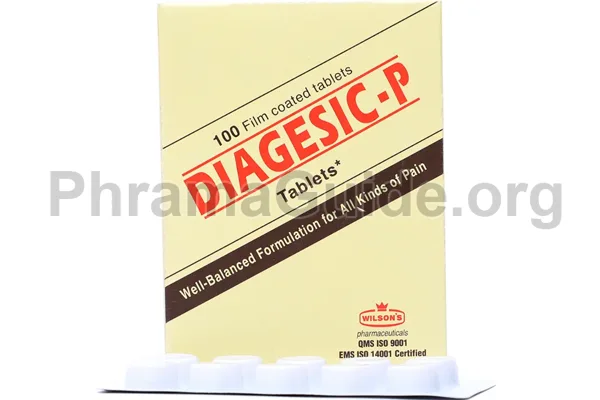Diagesic-P is a combination of multiple drugs, that are commonly used to treat mild to moderate pain, inflammation, and muscle spasms. Diagesic-P can cause the following side effects:
Common Side Effects
- Gastrointestinal disturbances: These are the most common side effects of Diagesic-P and may include nausea, diarrhea, vomiting, abdominal pain, and flatulence. Taking Diagesic-P with food can help reduce these side effects.
- Allergic reactions: Although rare, some people may experience allergic reactions, such as hives, swelling, or difficulty breathing, while using Diagesic-P.
- Restlessness: Common side effects of Diagesic-P can include restlessness, insomnia, increased heart rate, and jitteriness.
Less Common Side Effects
- Liver Problems: High doses or prolonged use of Diagesic-P can lead to liver damage or liver failure, which can be life-threatening.
- Central nervous system effects: Some individuals may experience dizziness, confusion, or other central nervous system-related side effects of Diagesic-P, although these are uncommon.
- Neuroleptic Malignant Syndrome (NMS): More serious side effects associated with Diagesic-P may include irregular heart rhythms, neurological symptoms, and potentially life-threatening conditions like neuroleptic malignant syndrome (NMS).

What is Diagesic-P?
Diagesic P is one of the leading brands with a combination of Paracetamol, Caffeine, and Thioridazine, manufactured and marketed by Wilson’s Pharmaceuticals, Pakistan.
Diagesic-P : Available Formulations and Strengths
Presently, Diagesic P is available in Tablet Form
Diagesic P Tablet : Paracetamol 500mg, Caffeine 70mg, and Thioridazine 3mg strengths
What Are The Possible Drug Interactions of Diagesic P?
Here are some general considerations regarding potential drug interactions with these components of Diagesic-P.
Paracetamol
- In Diagesic-P paracetamol can interact with certain medications, especially those that affect the liver, as Paracetamol is metabolized in the liver. It may enhance the effects of medications that also affect the liver, potentially increasing the risk of liver toxicity.
- Alcohol consumption should be limited when taking (paracetamol) containing Diagesic-P, as both can affect the liver, and their combination can increase the risk of liver damage.
Caffeine
- In Diagesic-P Caffeine can interact with various medications, including those that affect the central nervous system or heart rate. It can potentiate the stimulating effects of other drugs and may lead to increased heart rate, anxiety, or other side effects.
- Combining (caffeine) contained in Diagesic-P with medications that have a diuretic effect may increase the risk of dehydration.
Thioridazine
- In Diagesic-P thioridazine can have significant interactions with other medications, including those that affect heart rhythms (QT-prolonging drugs). Combining Thioridazine with certain other medications can increase the risk of serious cardiac arrhythmias.
- Thioridazine can interact with drugs that affect central nervous system function, potentially leading to increased sedation and drowsiness.

Leave A Comment